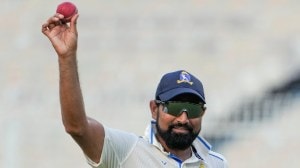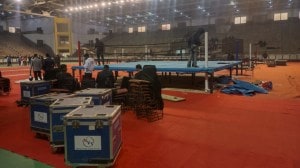Dubious IT8217;, dud NBFC stocks in Sebi8217;s rolling settlement list
MUMBAI, FEBRUARY 8: In a bid to curb the rising price manipulation and volatility, the Securities and Exchange Board of India SEBI on Tu...

MUMBAI, FEBRUARY 8: In a bid to curb the rising price manipulation and volatility, the Securities and Exchange Board of India SEBI on Tuesday increased the number of shares under compulsory rolling settlement to around 150 from 10. The regulator has included 74 companies which changed their names to bring the infotech tag and 31 non-banking finance companies whose applications for certification have been rejected by the Reserve Bank of India in the new list.
This means share transactions in these companies will have to be compulsorily squared up on the same day. Currently, operators get five days to settle the transactions and they resort to excessive speculative build-up to manipulate stock prices. 8220;We have raised the number of scrips to rolling settlement to around 150, which comprises four different categories. There are different companies which have changed names to IT information technology 8211; these firms are included in rolling settlement,8221; said SEBI official.
He said the list would have all the 74 firms which had changed their names to infotech sounding ones. However, the rolling settlement list would not include firms which form part of the quot;Aquot; group. Shares in the quot;Aquot; group can be carried forward in the present weekly settlement.
The list will also include 31 NBFCs whose applications for certification have been rejected by the Reserve Bank of India. Many such NBFCs had shot up on the stock exchanges recently. Further, 35 fairly liquid B1 group scrips under compulsory demat and 15 to 18 companies reporting high volatility were also put in the new rolling settlement list. 8220;The Sebi move will stop rigging in such stocks. Currently, share prices of many new infotech8217; companies and NBFCs are rigged on the market,8221; said an analyst. 8220;The move to expand the rolling settlement list will benefit genuine investors. Excessive speculation will be curbed,8221; said BSE broker Pawan Dharnidharka.
The main objective of introducing rolling settlement was to bring the Indian securities market on par with developed markets with low market risk and equipped with modern infrastructure, he added.
DEMAT LIST EXPANDED: The securities watchdog has also increased the list of scrips under compulsory dematerialised trading for institutional investors from the present 418 to 750, while compulsory demat for all categories of investors has been increased by 350 from the current 199. Elaborating about the major decisions taken by the SEBI board, a senior SEBI official said that the demat will happen in phases with various deadlines of March 21, May 8 and June 26.
Companies coming out with fresh initial public offering IPO or companies whose draft prospectuses are still pending with Sebi can offer investors the option of holding their securities either in physical or demat form, but these companies must enter into agreements with both NSDL and CDSL and should commence trades in demat form in the first day of trading itself. quot;This is to ensure that from day one itself they start with a clean slate,quot; Sebi officials said.
Moreover, companies which have not signed an agreement with either depository should sign it within March 31, failing which the stock exchanges would be asked to suspend trading in these scrips until they sign the agreement with the depositories, SEBI said. With respect to those companies regarding whom complaints have been received from investors about delay in demat, Sebi said that the depositories have been asked to furnish their names and the list of companies will be published at periodic intervals from March 1, this year.
B1 group scrips which are already under the demat mode would be brought under rolling settlement in March, while the remaining scrips would be brought under T58242; mode of settlement by May 8. 8220;The main objective of introducing rolling settlement was to bring the Indian securities market on par with developed markets with low market risk and equipped with modern infrastructure,8221; said a Sebi official.
- 01
- 02
- 03
- 04
- 05






























